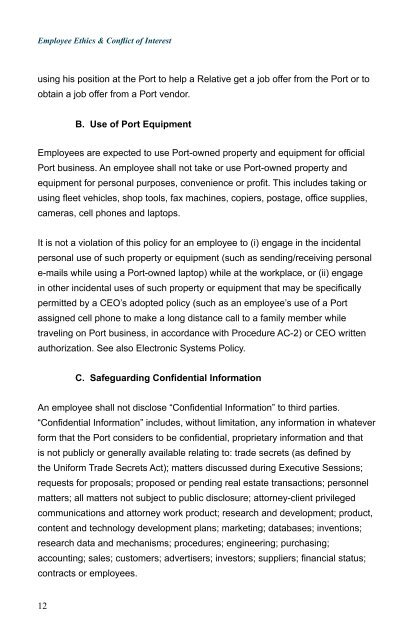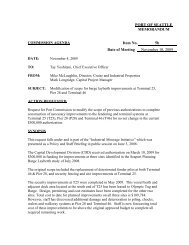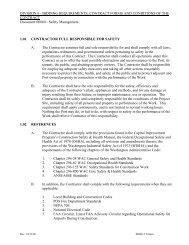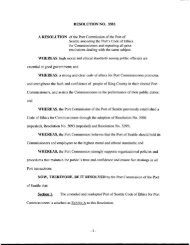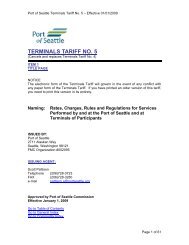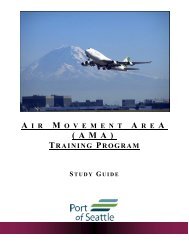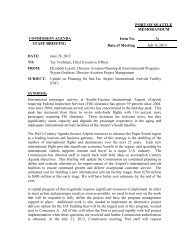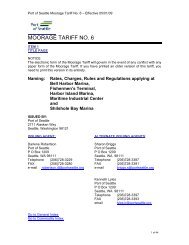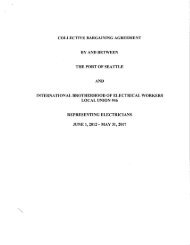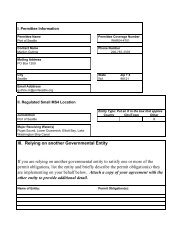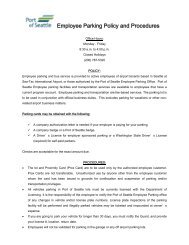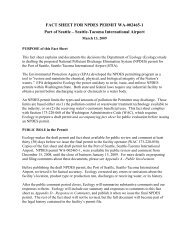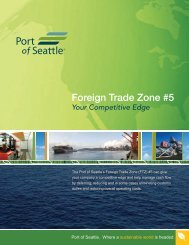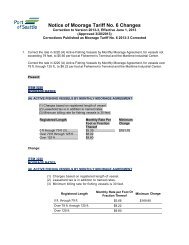Workplace Responsibility Employee Handbook - Port of Seattle
Workplace Responsibility Employee Handbook - Port of Seattle
Workplace Responsibility Employee Handbook - Port of Seattle
Create successful ePaper yourself
Turn your PDF publications into a flip-book with our unique Google optimized e-Paper software.
<strong>Employee</strong> Ethics & Conflict <strong>of</strong> Interest<br />
using his position at the <strong>Port</strong> to help a Relative get a job <strong>of</strong>fer from the <strong>Port</strong> or to<br />
obtain a job <strong>of</strong>fer from a <strong>Port</strong> vendor.<br />
B. Use <strong>of</strong> <strong>Port</strong> Equipment<br />
<strong>Employee</strong>s are expected to use <strong>Port</strong>-owned property and equipment for <strong>of</strong>ficial<br />
<strong>Port</strong> business. An employee shall not take or use <strong>Port</strong>-owned property and<br />
equipment for personal purposes, convenience or pr<strong>of</strong>it. This includes taking or<br />
using fleet vehicles, shop tools, fax machines, copiers, postage, <strong>of</strong>fice supplies,<br />
cameras, cell phones and laptops.<br />
It is not a violation <strong>of</strong> this policy for an employee to (i) engage in the incidental<br />
personal use <strong>of</strong> such property or equipment (such as sending/receiving personal<br />
e-mails while using a <strong>Port</strong>-owned laptop) while at the workplace, or (ii) engage<br />
in other incidental uses <strong>of</strong> such property or equipment that may be specifically<br />
permitted by a CEO’s adopted policy (such as an employee’s use <strong>of</strong> a <strong>Port</strong><br />
assigned cell phone to make a long distance call to a family member while<br />
traveling on <strong>Port</strong> business, in accordance with Procedure AC-2) or CEO written<br />
authorization. See also Electronic Systems Policy.<br />
C. Safeguarding Confidential Information<br />
An employee shall not disclose “Confidential Information” to third parties.<br />
“Confidential Information” includes, without limitation, any information in whatever<br />
form that the <strong>Port</strong> considers to be confidential, proprietary information and that<br />
is not publicly or generally available relating to: trade secrets (as defined by<br />
the Uniform Trade Secrets Act); matters discussed during Executive Sessions;<br />
requests for proposals; proposed or pending real estate transactions; personnel<br />
matters; all matters not subject to public disclosure; attorney-client privileged<br />
communications and attorney work product; research and development; product,<br />
content and technology development plans; marketing; databases; inventions;<br />
research data and mechanisms; procedures; engineering; purchasing;<br />
accounting; sales; customers; advertisers; investors; suppliers; financial status;<br />
contracts or employees.<br />
12


